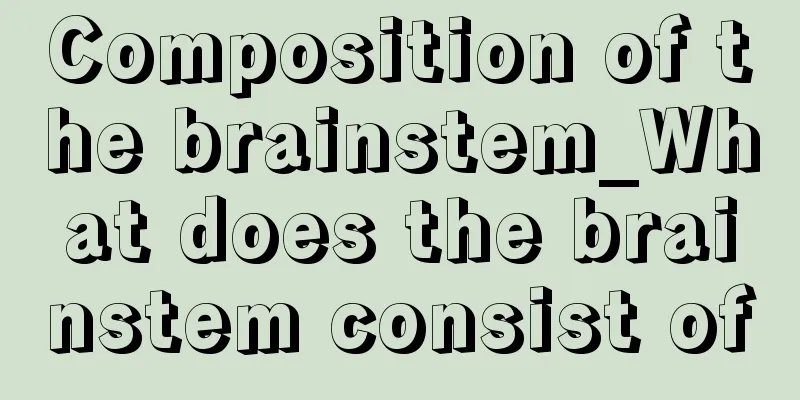Digitalis poisoning

|
In clinical medicine, medication is an indispensable treatment method and is also an effective treatment method for many diseases. There are many types of drugs, and the effects and functions of different types of drugs are somewhat different. Digitalis is a relatively common drug. Of course, if this drug is used improperly, it is likely to cause the patient to experience the following symptoms: 1. Gastrointestinal reactions It is usually the earliest manifestation of digitalis poisoning, manifested by nausea, vomiting, and loss of appetite. The first symptom is usually loss of appetite, sometimes followed by diarrhea. It is usually difficult to determine whether these symptoms are caused by digitalis poisoning. It is necessary to carefully observe the patient's condition and rule out other possible causes, such as congestion in the systemic venous system and gastrointestinal hypoxia during right heart failure, which can also cause these gastrointestinal symptoms. Gastrointestinal reactions during digitalis poisoning are believed to be not the result of direct stimulation of the gastrointestinal mucosa by digitalis drugs, but the result of digitalis acting on the emetic chemoreceptors in the posterior pole of the medulla oblongata, causing vomiting reflexively. Due to the slow reaction of elderly patients, the first symptoms of digitalis poisoning may not be nausea and vomiting, so attention should be paid. 2. Neurological symptoms May cause dizziness, headache, fatigue, changes in consciousness, mental abnormalities, yellow vision, green vision, etc. Fatigue, drowsiness, and changes in mental status may occur earlier, especially in elderly patients. During the treatment of heart failure, patients may also experience these symptoms due to disorders in water, electrolytes, acid and alkali balance, so care should be taken to differentiate them. Cardiotoxicity Cardiac toxicity reactions are easily recognized and noticed by clinicians, and are often related to the severity of such toxicity reactions. Cardiotoxic reactions are primarily arrhythmias, including abnormalities in impulse formation and conduction. The mechanism by which digitalis causes arrhythmias: ① Shortening the effective refractory period of the atrial and ventricular muscles, accelerating the rate of automatic depolarization in the diastolic phase of the action potential, leading to increased ectopic excitability of the atrial and ventricular muscles, especially ventricular ectopic excitability, which may lead to frequent ventricular premature beats, ventricular bigeminy, tripeminy, multifocal ventricular premature beats, ventricular tachycardia (VT) and ventricular fibrillation. ② Increase vagal nerve tone, which can directly inhibit atrioventricular node conduction and increase the responsiveness of the sinoatrial node and atrioventricular node to the vagus nerve and acetylcholine, thus causing sinus arrest, sinoatrial block, high degree or even complete atrioventricular block. |
<<: The hardest part of the human body is
>>: Will semen grow bacteria if left for a long time?
Recommend
How long does it take for an eye injury to recover
If the eyes are injured, they must be repaired in...
72Can gastric cancer and cerebral infarction be treated surgically?
Generally speaking, if the patient is in good phy...
What is molecular targeted therapy for nasopharyngeal carcinoma and what other treatments are there?
There are more and more patients with nasopharyng...
Early detection of liver cancer symptoms is helpful in controlling the disease
Liver cancer is the most common type of cancer. M...
These 5 early symptoms indicate that you have liver cancer. Don't be stupid and don't know them
In recent years, the incidence of liver cancer ha...
What is the medicinal value of potassium nitrate
Potassium nitrate is widely used in agriculture. ...
What are some traditional Chinese medicines that can soothe the liver and relieve depression?
If liver qi stagnation occurs, it will often lead...
Why do I bite my tongue when I fall asleep
When it comes to sleeping, everyone will think of...
Early symptoms of pituitary tumor
Pituitary tumor is a tumor disease. Although most...
What is bile duct cancer and how to check it
With the improvement of living standards, we are ...
There is a small fleshy lump in the mouth
A small fleshy pimple in the mouth may be caused ...
Glue cleaner is not a panacea, this is how glue should be removed!
In our daily lives, we come into contact with var...
Purple wolfberry efficacy and function
The functions and effects of purple wolfberry are...
What is the conservative treatment for varicose veins in the lower limbs?
There are many common diseases in daily life, and...
What are the treatments for primary liver cancer? What are the dietary care methods for liver cancer?
What are the treatments for primary liver cancer?...









